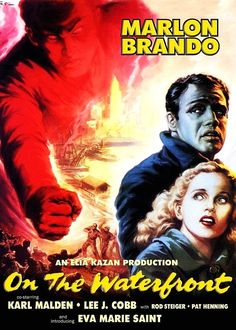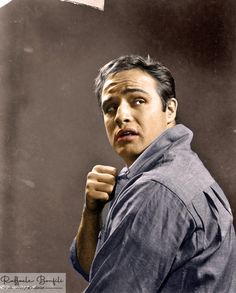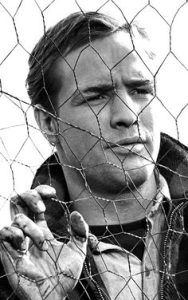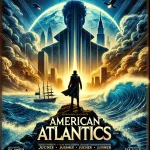On the Waterfront (1954)

🎥 On the Waterfront (1954) 🚢👊
On the Waterfront is a powerful and poignant drama directed by Elia Kazan that premiered in 1954. Renowned for its gripping storytelling and stellar performances, the film addresses themes of corruption, redemption, and the moral struggles of its protagonist, making it a landmark in American cinema.

The story centers around Terry Malloy (Marlon Brando), a former boxer who now works as a longshoreman on the docks of Hoboken, New Jersey. Caught in a web of corruption and labor racketeering controlled by the ruthless union boss Johnny Friendly (Lee J. Cobb), Terry struggles with his conscience as he witnesses the exploitation and intimidation of his fellow dockworkers. The film opens with Terry’s internal conflict as he grapples with his loyalty to the corrupt union and his desire to do what is right.
As the narrative unfolds, Terry’s life takes a pivotal turn when he becomes involved with Edie Doyle (Eva Marie Saint), the sister of a murdered dockworker. Through Edie, Terry is exposed to the harsh realities of the union’s grip on the workers and begins to question his own complicity in the corrupt system. This relationship serves as a catalyst for his transformation, pushing him to confront his past and seek redemption.

Marlon Brando’s performance as Terry Malloy is nothing short of iconic, showcasing his ability to convey vulnerability and strength. His portrayal earned him an Academy Award for Best Actor and remains one of the most memorable performances in film history. The film’s famous line, “I coulda been a contender,” encapsulates Terry’s regret and longing for a better life, resonating with audiences on a deeply emotional level.
On the Waterfront is also notable for its strong supporting cast, including Rod Steiger as Terry’s brother Charley, who represents the conflicted nature of loyalty and morality, and Karl Malden as Father Barry, who stands as a moral compass for the community, encouraging the dockworkers to speak out against the injustices they face.
Visually, the film captures the gritty atmosphere of the docks and the struggles of working-class life. Kazan’s direction, combined with the powerful screenplay by Budd Schulberg, creates a tense and immersive experience, drawing viewers into the moral dilemmas faced by the characters.
The film’s themes of individual conscience versus collective action, as well as the fight against corruption, resonate strongly in today’s society. It raises important questions about the nature of courage and the personal sacrifices that come with standing up for what is right.

In summary, On the Waterfront is a timeless classic that explores the complexities of morality, redemption, and human dignity. With its unforgettable performances, compelling narrative, and social relevance, the film has left an indelible mark on cinematic history. It is a must-watch for anyone interested in powerful storytelling and the human condition, inviting viewers to reflect on their own choices and the impact they have on those around them. Prepare to be moved by a story of struggle, courage, and the quest for justice in a world fraught with challenges!











